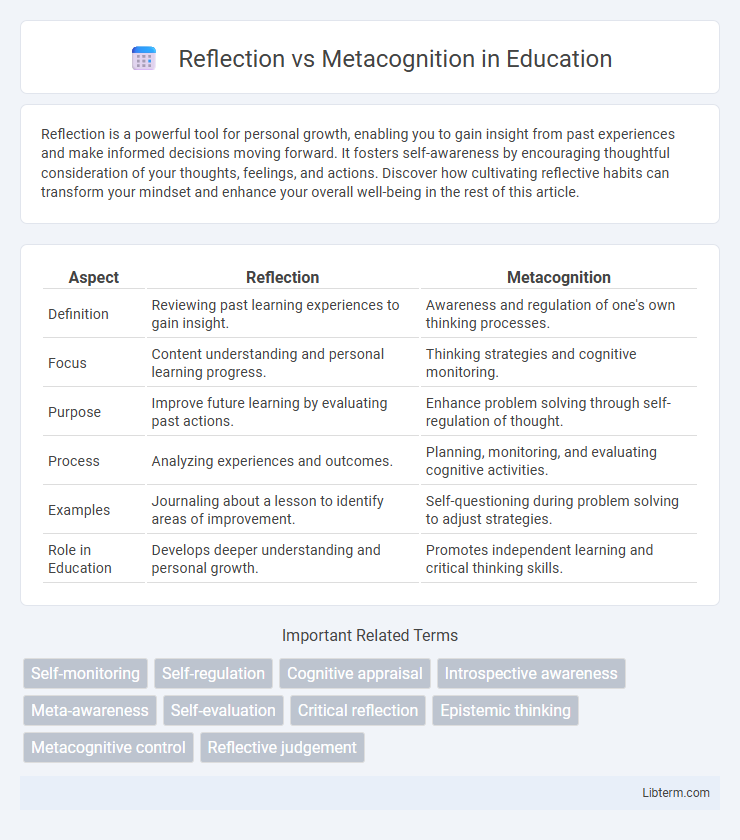Reflection is a powerful tool for personal growth, enabling you to gain insight from past experiences and make informed decisions moving forward. It fosters self-awareness by encouraging thoughtful consideration of your thoughts, feelings, and actions. Discover how cultivating reflective habits can transform your mindset and enhance your overall well-being in the rest of this article.
Table of Comparison
| Aspect | Reflection | Metacognition |
|---|---|---|
| Definition | Reviewing past learning experiences to gain insight. | Awareness and regulation of one's own thinking processes. |
| Focus | Content understanding and personal learning progress. | Thinking strategies and cognitive monitoring. |
| Purpose | Improve future learning by evaluating past actions. | Enhance problem solving through self-regulation of thought. |
| Process | Analyzing experiences and outcomes. | Planning, monitoring, and evaluating cognitive activities. |
| Examples | Journaling about a lesson to identify areas of improvement. | Self-questioning during problem solving to adjust strategies. |
| Role in Education | Develops deeper understanding and personal growth. | Promotes independent learning and critical thinking skills. |
Understanding Reflection: A Foundational Overview
Reflection involves the process of thoughtfully considering experiences and actions to gain deeper insights and improve future outcomes. It is a foundational practice that fosters self-awareness and critical thinking by examining one's thoughts, emotions, and behaviors in context. This reflective process serves as the base for metacognition, which extends beyond reflection by including awareness and regulation of one's own cognitive processes.
Defining Metacognition: Thinking About Thinking
Metacognition refers to the awareness and regulation of one's own cognitive processes, enabling individuals to think about their thinking strategically. It involves monitoring comprehension, planning approaches to learning, and evaluating outcomes to enhance problem-solving and decision-making skills. Reflective practices support metacognition by prompting learners to analyze their thought patterns and adjust strategies for improved intellectual performance.
Key Differences Between Reflection and Metacognition
Reflection involves reviewing past experiences to gain insights and improve future actions, emphasizing conscious thought about what has already occurred. Metacognition refers to awareness and control over one's own thinking processes, including planning, monitoring, and evaluating cognitive tasks. The key difference lies in reflection's retrospective nature versus metacognition's active regulation of ongoing cognitive activities.
Cognitive Processes Involved in Reflection
Reflection involves deliberate thinking about past experiences to gain deeper understanding and improve future actions, engaging cognitive processes such as memory recall, analysis, and evaluation. It activates metacognitive skills by requiring individuals to monitor their own thought patterns, recognize cognitive biases, and adjust strategies accordingly. These overlapping cognitive mechanisms enhance self-awareness and promote adaptive learning behaviors.
The Mechanisms of Metacognitive Awareness
Metacognitive awareness involves monitoring and regulating one's cognitive processes, including planning, evaluating, and adjusting strategies during learning or problem-solving. Reflection is often a component of metacognition, serving as a conscious review of experiences to enhance understanding and performance. The mechanisms of metacognitive awareness include metacognitive knowledge (awareness of tasks, strategies, and self) and metacognitive regulation (control over cognitive activities), essential for effective self-directed learning and adaptation.
Practical Applications: Reflection in Everyday Life
Reflection in everyday life enhances self-awareness by encouraging individuals to evaluate their thoughts, emotions, and behaviors regularly. This practice supports decision-making and problem-solving across personal and professional contexts by fostering a deeper understanding of experiences. Practical applications include journaling, mindful pauses after significant events, and deliberate consideration of feedback to drive continuous self-improvement.
Enhancing Learning Through Metacognitive Strategies
Metacognitive strategies involve actively monitoring and regulating one's cognitive processes to improve learning outcomes. Unlike reflection, which is often a passive review of past experiences, metacognition requires planning, self-assessment, and adaptive adjustment of learning tactics in real time. Research shows that students employing metacognitive skills demonstrate higher comprehension, better problem-solving abilities, and increased academic achievement.
Examples: Reflection vs Metacognition in Education
Reflection involves students reviewing their learning experiences to understand what they did well or need to improve, such as writing a journal entry after completing a group project. Metacognition goes deeper by encouraging students to think about how they think and learn, for example, planning strategies before tackling a math problem and monitoring their comprehension during the task. In education, reflection helps consolidate knowledge, while metacognition fosters self-regulated learning by making students aware of their cognitive processes.
Benefits and Challenges of Each Approach
Reflection enhances self-awareness by encouraging individuals to analyze their thoughts and actions, fostering personal growth and improved decision-making. Metacognition involves thinking about one's own cognitive processes, leading to better problem-solving skills and adaptive learning strategies. Challenges of reflection include potential bias and emotional discomfort, while metacognition may demand higher cognitive effort and can be difficult to develop without proper guidance.
Integrating Reflection and Metacognition for Optimal Growth
Integrating reflection and metacognition enhances self-awareness and critical thinking by encouraging individuals to analyze their learning processes and outcomes deeply. Reflection allows learners to evaluate experiences and emotions, while metacognition focuses on planning, monitoring, and regulating cognitive strategies. Combining both approaches fosters continuous improvement, leading to optimal personal and academic growth through mindful adaptation and strategic problem-solving.
Reflection Infographic

 libterm.com
libterm.com